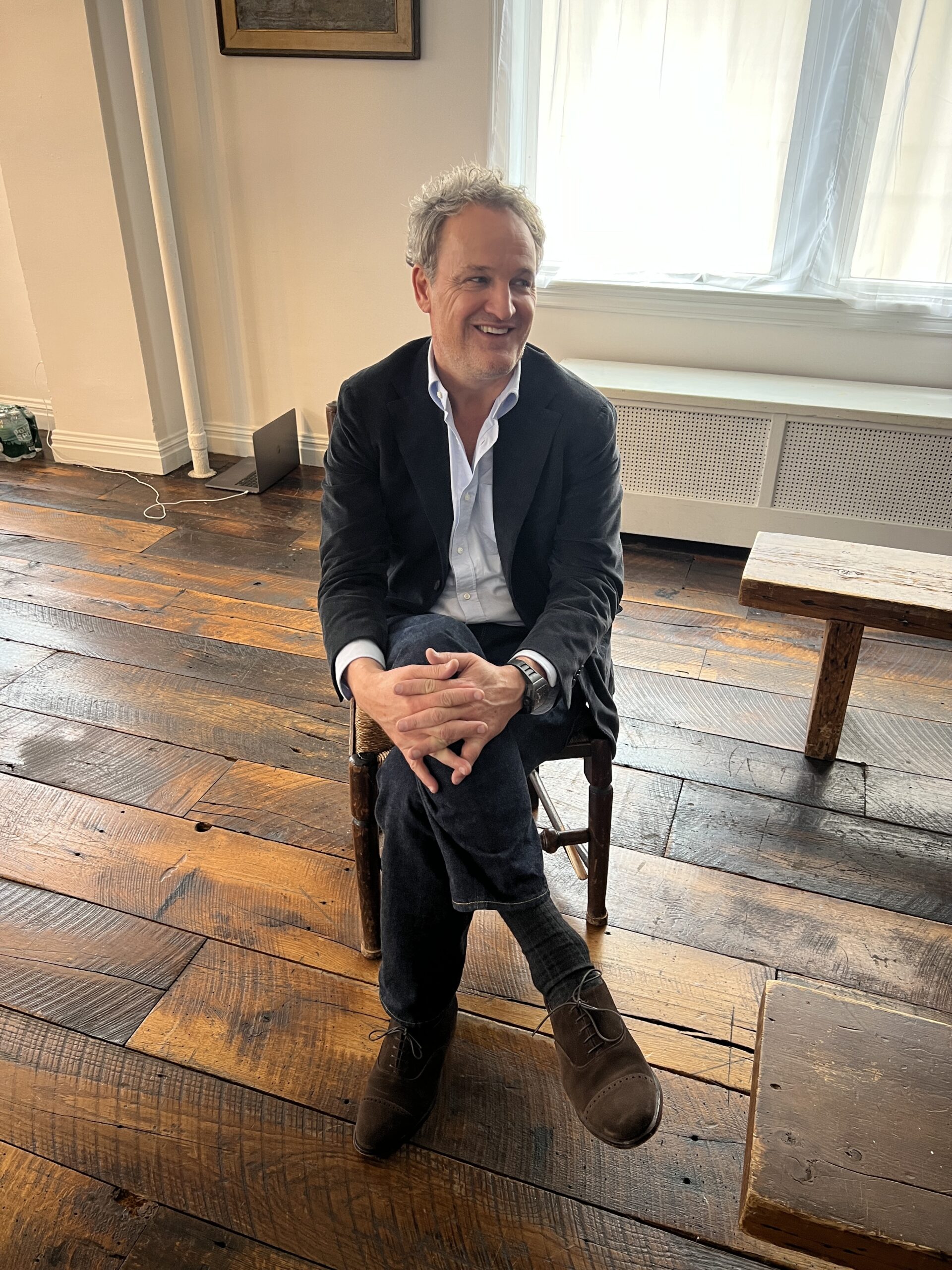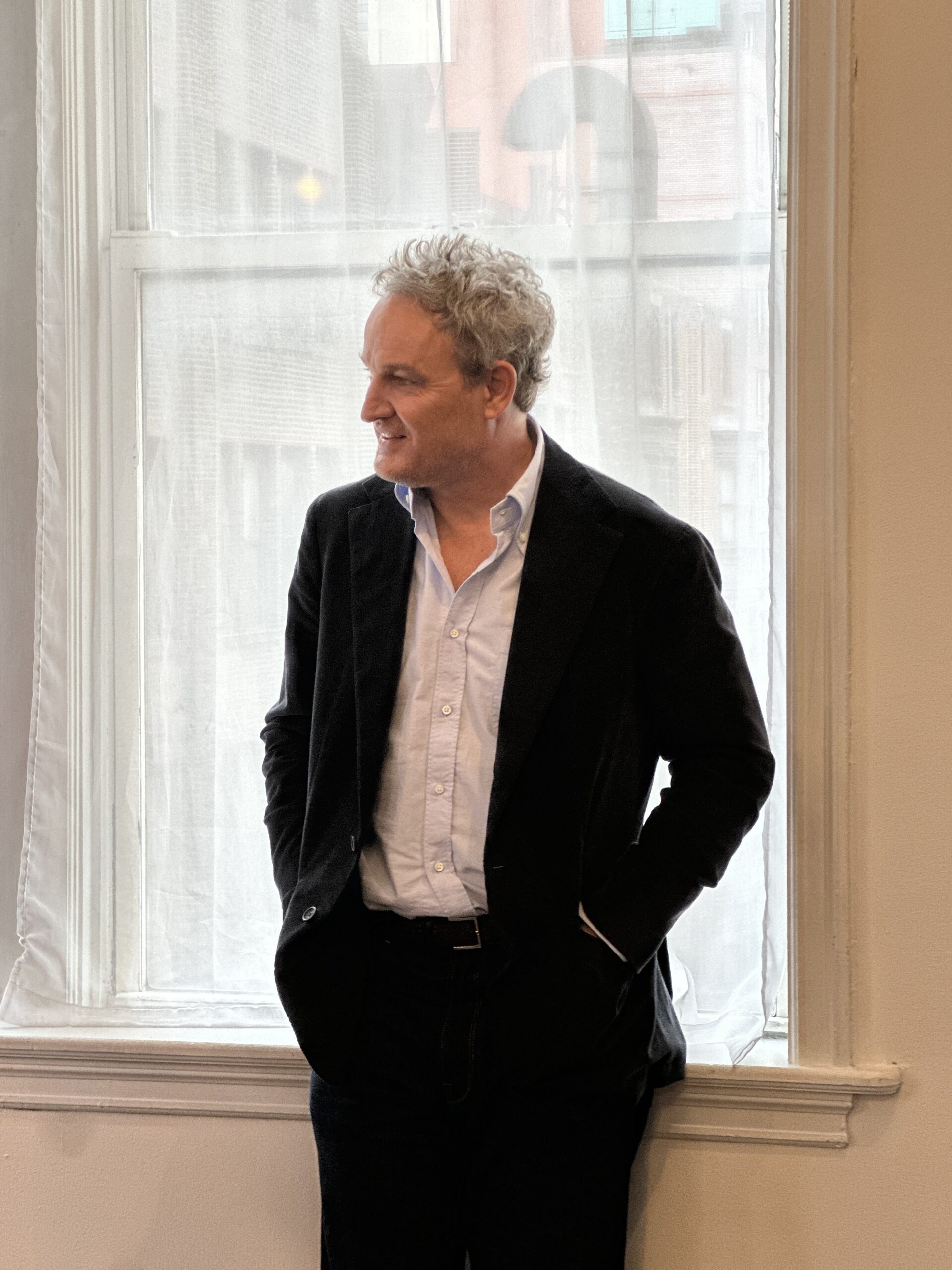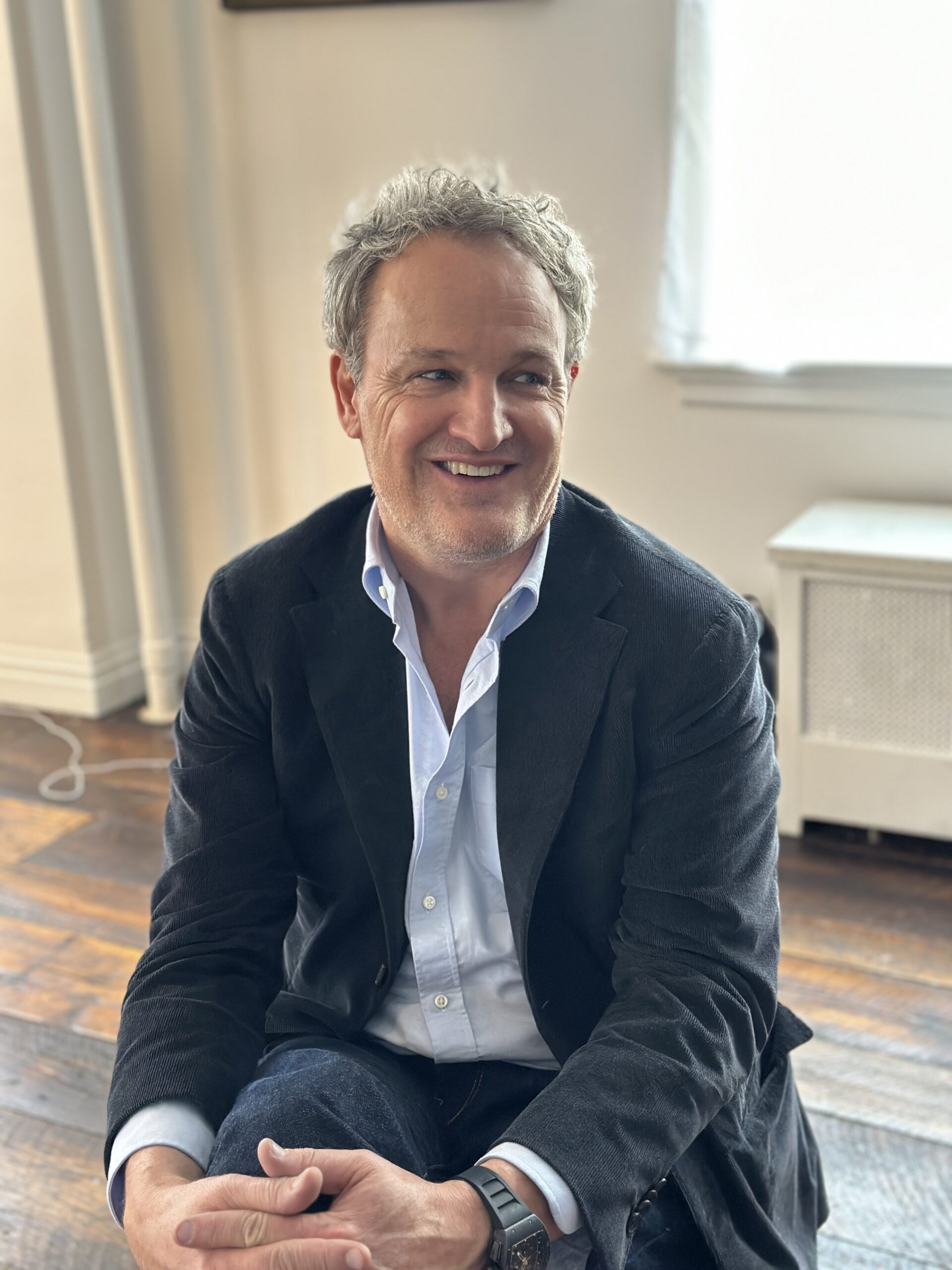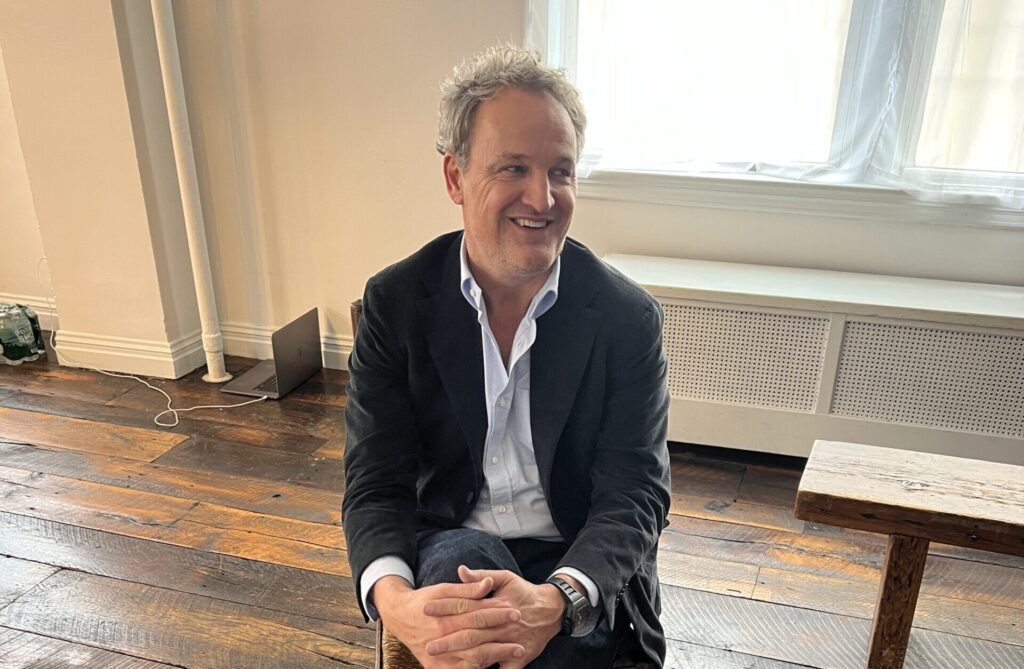
Photos courtesy of Jason Clarke.
Jason Clarke has built a career showing that it’s possible to vanish into difficult characters without becoming one yourself. His portrayal of Alex Murdaugh in Hulu’s Murdaugh: Death in the Family is so convincing that you might find yourself sympathizing with a man who murdered his wife and son—which is precisely the point. Clarke doesn’t play Murdaugh as a monster, but as something far more terrifying: an unknowable man who seemed kind of harmless, until he wasn’t. We sat down with the Australian actor to discuss crime, bad choices, psychological boundaries, and his physical transformation into America’s most infamous “aw, shucks” murderer.
———
ALISSA BENNETT: Jason, I want to prepare you first, because this is not my usual beat.
JASON CLARKE: I had a look; I know you’ve got a varied curriculum.
BENNETT: Usually I focus on writers, disgraced personalities, and criminals.
CLARKE: Interesting, you’ve probably got a good crowd there.
BENNETT: But I’m so interested in actors! Do people ever recognize you on the street?
CLARKE: Not so much. I’m pretty cool. I don’t do a lot of press, so I’m still able to get around and live my life.
BENNETT: Well then, I’m extra delighted to talk to you about your latest project. I don’t know if you’re aware that it’s the second dramatization of the Murdaugh story, because there was a Lifetime movie in 2023..
CLARKE: I found out before we were shooting. I thought, “I’m not going to fucking press play on that.” And then curiosity got the better of me.
BENNETT: And?
CLARKE: Oh, I stopped.
BENNETT: I’m a Lifetime fanatic, and I haven’t seen it, so this shocked me. I felt like, “How did I miss this?”
CLARKE: It’s no disrespect to anybody. It’s just like, you’ve got to create your own thing. You can’t watch Marlon Brando’s Streetcar too much if you’re going to walk on stage.
BENNETT: I wrote this down, and I hope it doesn’t offend anyone, but you play American celebrity murderer, Alex Murdaugh on this show.
CLARKE: Yeah. It’s funny, I spelled that phonetically with my dialect coach; he pronounces his name, “Alec Mer-duck.”
BENNETT: Must be a Southern thing.
CLARKE: Yeah. He will actually use different pronunciations at different times, but that’s the one he generally used the most.
BENNETT: How long did you train to do that South Carolina accent?
CLARKE: Months.
BENNETT: Alex Murdaugh is very important within the pantheon of recent American crimes, and we’re quite serious about our crime here, so it’s really terrific that you played him in such a convincing way. How did you prepare?
CLARKE:I listened to him on headphones for a long time before I watched footage, and then to put on the physicality, I started to watch the trial. I knew I had to be very careful not to judge the man, because I was going to play him; I knew I had to play with what people perceive while also shining light on the places where people have missed things. Listening to the trial, there were a lot of moments where I thought, “Oh my god, I can’t believe that he did this,” but then also I had moments where I thought, “I can’t believe they convicted him.” There was a whole period where I was virulently defending the man in my own mind.
BENNETT: Because you were going to have to become him?
CLARKE: Yes, but also because I could see that he built up an incredible wall in his own mind.
BENNETT: I think that part of what is compelling—in the performance but also in the story—is that Alex Murdaugh is sort of unknowable. I felt really conflicted watching the show because you don’t play him as a deranged, detestable maniac. There are moments where he reminded me of a drunk uncle who might pull down his pants and smash a beer can on his head at a pool party.
CLARKE: There was a picture I saw of him where he’s doing a shot. One of his son’s girlfriends is giving him a shot on a boat, and I thought, “I’m going to put that in there…”
BENNETT: I think in the show he seems kind of fun at times!
CLARKE: He was fun. Episode three’s all about that too. “Let’s have a bit of a ball. Give him a bit of the old red magic, come on, Bubba.”
BENNETT: Oh my god, say it again!
CLARKE: [Laughs] “Come on, Bubba.”
BENNETT: That’s the episode where they go on vacation.
CLARKE: They go to the Bahamas.
BENNETT: When Alex puts the shrimp down his shorts and they’re all wasted, I felt like, “I would dance with this guy on a cruise ship.”
CLARKE: I know, I know.
BENNETT: And then I was like, “I wonder if I’m mentally ill, because I think he looks like a good time.”

CLARKE: I don’t think anybody ever knew this man, and that’s what the judge said in court. “Even in this trial, I saw you two weeks after you’d killed your son and wife, and I had no idea all this stuff was going on” There was one day, I remember one of their actors walked up to me and just said, “Jason, I’ve got no idea who your character is.”
BENNETT: Oh, you must have felt like “That’s perfect!”
CLARKE: That was it for me, because I hadn’t said it out loud to anybody, but I never wanted anybody to be able to get a line on me and just say, “Let me sum you up.” I don’t think you can sum this man up. A man that does what he does—and he’s not a lunatic either. He’s also got the constitution of a horse. He’s still going! He hasn’t collapsed, he hasn’t fallen in a hole in prison.
BENNETT: He’s probably fun in prison.
CLARKE: He’s still trucking, but I think he’s got a lot of issues. People are trying to sell information on him, and you can find places online where prisoners are swapping stuff on their phones, there might be a snippet of a video or some dialogue of him. They’re trying to extort money from him too.
BENNETT: Is there any money left?
CLARKE: Who knows? There’s a lot of money that went around.
BENNETT: There was a lot of money that went to the pill dealer.
CLARKE: The pills were expensive, the trips were expensive. He lived large.
BENNETT I think it’s really interesting that you had to go into this role with a certain amount of generosity in order to play Murdaugh as a real person and not just a monster.
CLARKE: I had to. I felt like, “I’ve got to make it very, very hard for people to convict him.”
BENNETT: But at the same time, I’m sure Jason Clarke cannot imagine killing his wife and children.
CLARKE: You can never imagine killing your child, and that was something that always struck me—I couldn’t totally get my way around that. But you connect the dots, much like the prosecution did, and you realize that in his pyramid of importance in life, he made some decisions. The wife and child had to go.
BENNETT: Because I’m so interested in how quickly we malign people, there were moments in this case where I thought “Maybe this is unfair, maybe this isn’t the way it happened.”
CLARKE: But in the end, it all came down pretty heavy and hard, didn’t it? Once they realized Alex had stolen money from some of the most vulnerable people on the fuckin’ planet who had already suffered so much, any sense of sympathy or empathy is out the window.
BENNETT: Do you think the extreme interest Americans have in crime diminishes the humanity of victims at all?
CLARKE: That’s a very complex question. There’s a lot of people making a lot of stuff out of this, and it’s an industry; I guess we’re part of that. I tried to approach everything with some respect and dignity and give an honest portrayal of how these things can and do happen.
BENNETT: They say that if you’re caught doing one crime, it’s because you’ve done five without getting caught.
CLARKE: And you’ve let a lot of things slip. To walk up and shoot your son in cold blood, you’ve let a lot of things slip.
BENNETT: How pre-planned do you think it was? Alex Murdaugh is a person whose frontal lobe must have been fried on opiates.
CLARKE: Well, he planned well enough that nobody ever found the weapon, they never found blood on him, so. Facts are facts. And you can’t even deny that in terms of how you play him. So it’s like, yeah, if he’s blind and stupid, and he threw the phone out the window, well, that’s one thing as well, but he was smart enough to go, “You know what? There’s no smoking gun.”
BENNETT: He was a lawyer, he was an expert.
CLARKE: An expert in a way, and then so stupid in other ways. You just can’t believe he did what he did.
BENNETT: He got away with too many things. When you get away with too many things, you probably think, “I can do it again, and I can do it bigger.”
CLARKE: The fact that he thought he’d get away with it is insane.
BENNETT: Which is why you play him with so much self-deluded optimism.
CLARKE: He’s a cup-half-full guy.
BENNETT: It’s half full of beer. Part of what’s really compelling about your performance is that it completely informs the way I look at Murdaugh as a real person now. Is he being his true self when he commits the crime, or when he walks away and pretends it didn’t happen?
CLARKE: I think there’s a lot of compartmentalization. He doesn’t comprehend, fully, what he’s done. I’ve no doubt the pills have probably fogged a lot, but, man.
BENNETT: Eventually your performance becomes a double performance, because you’re performing Alex, who’s performing different versions of himself. He seems to have had a good deal of control in some instances, and absolutely none in others.
CLARKE: I think there must’ve been an element of him having to hold the reins tight, otherwise he would’ve shot himself.
BENNETT: Why do you think he didn’t?
CLARKE: It’s in his breeding to continue the line. And I think it ties to his choice, which was for continuity. That continuity was only going to happen if Paul, son number two, went, and mom just happened to be there. She had to go, too.
BENNETT: Do you think that’s it? She just happened to be there?
CLARKE: I think he did the math, and there was no way for it to work otherwise. She probably would’ve outed him or smelled him out. He wouldn’t have been able to continue the false relationship or the lies that he had with her.
BENNETT: I read today that when he called her to the house, she sent a text message to someone and said, “Something’s fishy.” And maybe that’s part of it, that he knew there was at least one person he couldn’t fool anymore because he’d hurt her too much.
CLARKE: I mean, he shot her clean.
BENNETT: She was running, right?
CLARKE: She was running towards him.
BENNETT: It’s interesting also to listen to the real 911 call, because it doesn’t seem performative. It feels real.
CLARKE: I think it was real, and it’s horrific. There would’ve been a bit of time where he’d been away, and he comes back, and he sees it.
BENNETT: But then he goes through this trial, and the affect is so strange. Artificial again.
CLARKE: When he takes the stand, you could hear in his voice that it’s not as easy as he thought it would be. The defense attorney is nervous too, and overdoes it. It’s such a bad opening performance. He picks it up a bit later on, but his open is just a fuckig’ mess.
BENNETT: Would you ever want to talk to him?
CLARKE: No.
ALISSA BENNETT: Because…
CLARKE: It just crosses a line for me. I can cerebrally explain it, but it wouldn’t explain the deep “no” inside of me.
BENNETT: That was a big no. I felt it.

CLARKE: Those were strange things for me to play. To do a lot of these things was very odd. To go up and shoot that scene was an odd thing.
BENNETT: The murder scene?
CLARKE: Yeah. And it was very simple, which I thought was good because it’s not ultimately about that. The act itself is horrific, and you see that.
BENNETT: The other part that really struck me is the reveal at the end of the show where it becomes apparent that his other son, Buster, was kind of spared. It reminded me of when the Columbine murderers went into that high school and told people, “Go home now. Don’t come to school today.”
CLARKE: Boom. You’re right. I like that.
BENNETT: Can you describe it?
CLARKE: Well, that’s exactly it. It’s the most basic question to ask, isn’t it? When Buster says to Alex, “Why didn’t you ask me to the house?” Alex hadn’t thought about that. That’s all I wanted to get across, and it is the most simple of questions, and the most simplest of tells.
BENNETT: And it cracks the whole thing open.
CLARKE: I wanted the conversation to have a sense of moving on. No shame about it at all. It’s just like, “Dude, don’t fucking go there. Do the math.”
BENNETT: Psychologically, in order to prepare to play this role, did you have to do it?
CLARKE: I don’t know about that.
BENNETT: But didn’t you have to think about yourself, as Alex Murdaugh, killing his child?
CLARKE: Well, I did the math as much as I could to go, “Okay, in my reality, what is this math?” And it took a long time to work that out in the script. Look, putting on all the weight, putting on the wig—
BENNETT: How’d you put the weight on?
CLARKE: I ate.
BENNETT: What’d you eat?
CLARKE: I mean, a lot.
BENNETT: Like…
CLARKE: Well—
BENNETT: I’m on a raw food diet, so I’d like to hear.
CLARKE: I was in France at the time, so I tried to do it with bread, pasta, with just heavy stuff. Eating late, eating early. I destroyed my metabolism, essentially, and I would have panic attacks because it was taking too long to put on. So then I would just eat a tub or two of ice cream, and then it just kept coming on.
BENNETT: And then you couldn’t get it off.
CLARKE: Couldn’t get it off. For six months, I was in tracksuit pants. I had nothing that got even close to fitting me. I didn’t want to go out. I felt overweight and miserable and sweaty, and my eyebrows were red, my hair was short. I had a neck problem from the wig burning me. And then the schedule itself was brutal.
BENNETT: Because you shot quickly?
CLARKE: Well, five or six months. But it really upset me. It was like, with a half-hour lunch, I have no time to take off my fat suit. On top of that, I wouldn’t have time to just sit down. I had to eat still, to keep it on. So I was having to scarf food and then shoot monster scenes back to back. I couldn’t have done it for much longer. Playing him really burnt my candle.
BENNETT: You made it so that a person watching understands how this unfolded. Because I think, otherwise, to just deal with whatever the speculation is or the rumors or the information that we can get on the internet are, it’s so flat. You made him into a real person.
CLARKE: I appreciate that.
BENNETT: It’s really incredible. There’s something in the complexity of how you played him that makes him seem so harmless.
CLARKE: Yes.
BENNETT: And that’s what makes it so scary.
CLARKE: It is. That’s why people trusted him.

